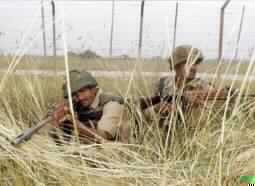HIGLIGHTS: 10 Villagers Killed in Pakistani-ruled Kashmir, 4 on the Indian Side||Armitage Expected in the Region in July||India Rejects a Pakistani Plan to Check for Guerilla Infiltrators||War Fears Pummeled Markets in Both Countries||STORY: The United States is sending Deputy Secretary of State, Richard Armitage to the sub-continent to reign in tensions between India and Pakistan who have been trading border fire over the past week rekindling fears of war between the two nuclear-armed rivals. (Read photo caption)
Analysts say Washington, which relies on Pakistan as a crucial ally in its war on terror and has U.S. troops in the country, is piling pressure on both sides to act with restraint.
FEARS OF WAR
Indian and Pakistani forces traded heavy machine gun and mortar fire across the Kashmir frontier for a fourth day on Monday. A Pakistani official said 10 villagers had died since the firing erupted on Friday while India said four had been killed.
Fear of war surged after a raid on an Indian army camp last Tuesday that India said was staged by Pakistan-based militants. Some 34 people, many wives and children of Indian soldiers, were killed.
Some analysts have drawn a link between the army camp raid -- the deadliest in eight months in Kashmir -- and a blast in the Pakistani port city of Karachi two weeks ago that killed 11 French engineers and three Pakistanis.
They blame them on Islamic extremists intent on attacking India and undermining Musharraf for backing the U.S.-led war on terrorism and his announcement in January of a crackdown on Muslim radicals.
The war fears pummeled financial markets in both countries on Monday.
ACTIVE AMERICAN DIPLOMACY
In Washington, a senior State Department official said Deputy Secretary of State Richard Armitage would probably arrive in the region in early June.
At the White House on Monday, National Security Adviser Condoleezza Rice said there was "a lot of active diplomacy" on the India-Pakistan front.
Pakistan's relationship with Washington has improved significantly since the September 11 attacks on the United States prompted Musharraf to cast his lot with the U.S. war on terrorism, centered on neighboring Afghanistan.
But Rice said Musharraf should keep his promise to stop the militants.
Taking heart of Washington's position, India has rejected talks until it says it sees proof Pakistani President Pervez Musharraf has honored a pledge he made in January to curb what India calls cross-border terrorism.
U.N. Secretary-General Kofi Annan, expressing concern at casualties, called on India and Pakistan to exercise restraint.
Pakistan has said it is willing to allow foreign observers on both sides of a military cease-fire line that divides Kashmir -- the trigger of two out of three wars between the countries -- to check for guerrilla infiltration into India.
But the offer was swiftly rejected by India.
JOCKYING FOR DIPLOMATIC SUPPORT
Pakistan on Monday urged other countries to "convince India to see reason" and hold discussions to avert a full-scale conflict.
"We hope the international community will increase its efforts...to convince India to see reason and come to the negotiating table," Pakistani Foreign Ministry spokesman Aziz Ahmed Khan said.
The Pakistani appeal came as India said it was mounting an "an intense campaign to sensitize world opinion" about what it says are Pakistan-based Islamic extremists targeting India.
INDIAN WAR MONGERING
Meanwhile, Indian Prime Minister Atal Behari Vajpayee, under pressure to stop attacks by Muslim militants, was due to visit disputed Kashmir on Tuesday to inspect the scene of the deadly raid last week.
While Vajpayee travels to Kashmir to visit the scene of that attack and meet survivors, Indian Defense Minister George Fernandes was due to visit front-line soldiers in the northwestern state of Rajasthan.
PHOTO CAPTION
Indian soldiers keep a vigil in the Samba sector on the Indo-Pak border 25 miles from Jammu, the winter capital of Jammu And Kashmir State May 20, 2002. Indian and Pakistani forces traded heavy fire across their frontier for a fourth day, fanning fears that escalating tensions between the nuclear-capable neighbors could push them into war. (Arun Singh/Reuters)
- Author:
& News Agencies - Section:
WORLD HEADLINES


 Home
Home Discover Islam
Discover Islam Quran Recitations
Quran Recitations Lectures
Lectures
 Fatwa
Fatwa Articles
Articles Fiqh
Fiqh E-Books
E-Books Boys & Girls
Boys & Girls  Articles
Articles










